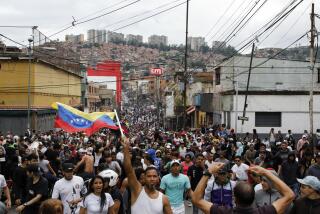Armenia Leader Is Short of Votes
- Share via
MOSCOW — As opposition supporters protested the results in Armenia’s presidential election and international observers cited cases of ballot-box stuffing and intimidation, the incumbent, Robert Kocharyan, failed to win an outright majority Thursday.
With his nation mired in severe poverty and no sign of a peace settlement in the deadlock over the disputed Nagorno-Karabakh region, Kocharyan, 48, could face a tough battle in the second round, due in two weeks.
The first round saw him pitted against a divided opposition made up of eight candidates, none of whom played heavily on the president’s failure to deliver peace in the conflict with neighboring Azerbaijan. Now he faces a single candidate, Stepan Demirchyan, the leader of the People’s Party.
International observers criticized the “serious irregularities” in the poll, tarnishing Armenia’s credibility as it struggles to shrug off a reputation for fraudulent elections.
Earlier in the day, Armenia’s Central Electoral Commission announced that Kocharyan had received 52.5% of the vote. Demirchyan’s supporters marched on the commission headquarters in the capital, Yerevan, where they clashed with riot police. Claiming election violations, they rejected the result and insisted that their candidate had won.
Demirchyan, 43, is the son of Karen S. Demirchyan, the Communist-era leader killed along with seven other officials by gunmen who stormed into parliament in 1999.
Many had predicted that President Kocharyan would win outright. The electoral commission issued updated results late Thursday announcing that Kocharyan had won 48.3% of the vote, short of the 50% required for outright victory. Demirchyan took 27.4%.
Armenia relies on U.S. aid and support from the Armenian diaspora in America, and despite economic growth, more than half the population lives below the poverty line.
One key economic problem for Armenia is the lack of a peace deal over Nagorno-Karabakh, a territory that split from Azerbaijan, with Armenia’s support, in a 1988-94 war.
Armenia is under an economic blockade by Azerbaijan and Turkey as a result, and it remains locked out of the regional economic benefits flowing from oil discoveries in the Caspian Sea.
Nagorno-Karabakh’s independence has not won international recognition, and despite intense international pressure on the sides to reach a peace deal, the deadlock remains unresolved.
Kocharyan, a native of Nagorno-Karabakh, came to power in 1998 promising peace, but repeated meetings between the Azerbaijani and Armenian leaders and sporadic rumors that the two were ready to do a deal have not led to concrete results.
In the past, Armenia’s elections have been marked by fraud and vote-rigging. Despite the use of transparent ballot boxes that were supposed to help prevent election fraud this time, observers from the Organization for Security and Cooperation in Europe and the Council of Europe Parliamentary Assembly criticized the ballot Thursday, citing numerous violations.
Political analyst Aghasi Yenokyan, director of the Armenian Center of Political and International Studies, said in a phone interview from Yerevan that Kocharyan badly needed victory in the first round and will face a tough battle to beat Demirchyan, who is expected to take all the opposition vote.
“The people of Armenia no longer trust the president and believe that his policies led the country to an abyss,” Yenokyan said.
He said people are unhappy about the many unresolved political assassinations, including the 1999 slaughter in the parliament and the killings of other top officials including the prosecutor-general, deputy interior minister and deputy defense minister.
“Judging by the ballot, the ‘devil-we-know’ situation does not satisfy the people anymore,” Yenokyan said. “They have gotten to know Kocharyan now, and they know that they do not like him. There is no guarantee that they will like Demirchyan better, but they are so sick and tired of the current incumbent that they are ready to try something else.”
Yenokyan said that there was little to choose among the economic programs of the candidates and that the poll was more about personality and style than substance.
He said the president came to power promising to resolve the Nagorno-Karabakh deadlock -- but had failed.
“Largely because of that, the economic crisis will continue due to the blockade of Armenia by Azerbaijan and Turkey,” the analyst said.
For most Armenians, the poverty and high unemployment that are a result of the blockade loom as larger problems than the failure to achieve peace over Nagorno-Karabakh.
“In his time, Robert Kocharyan came to power as a Karabakh hero and a leader who promised to resolve this problem. The paradox of this election is that all the candidates preferred to touch on the Karabakh problem as little as possible,” analyst Gevork Pogosyan, director of the Sociological Research Center in Yerevan, said in a phone interview.
He said one possible reason the opposition concentrated on the economy instead of the failure to produce a peace deal was that a compromise on Nagorno-Karabakh is unpopular with many voters.
*
Sergei L. Loiko of The Times’ Moscow Bureau contributed to this report.
More to Read
Sign up for Essential California
The most important California stories and recommendations in your inbox every morning.
You may occasionally receive promotional content from the Los Angeles Times.













